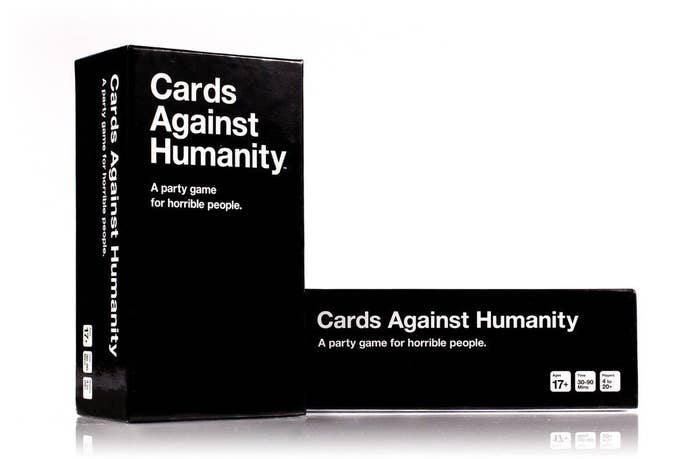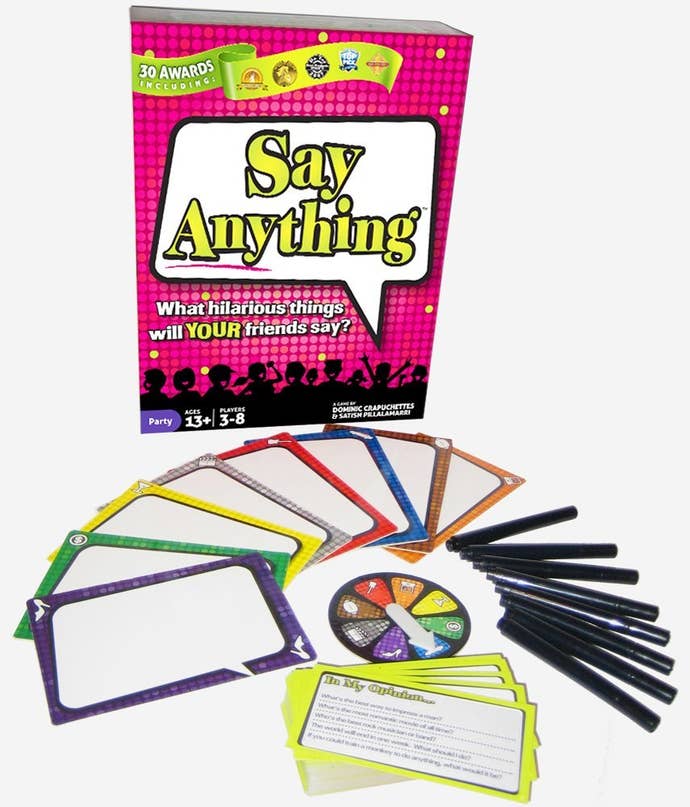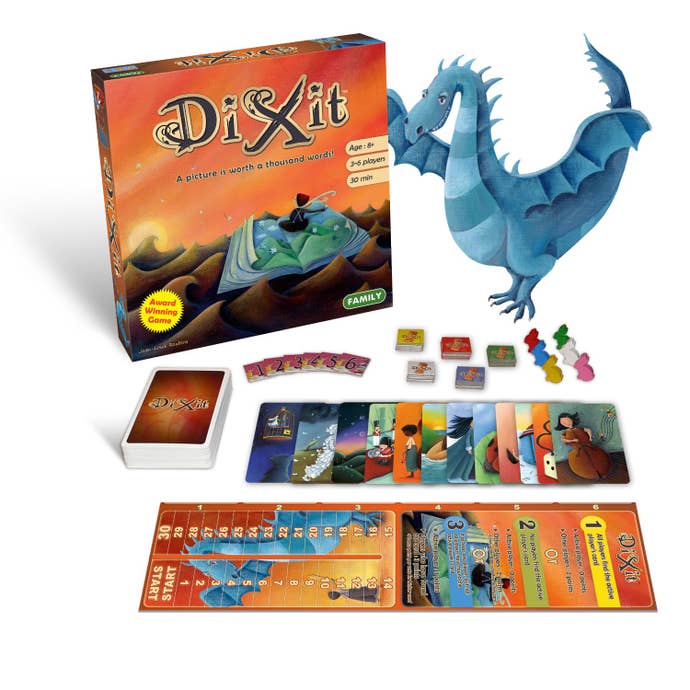BOARDgamer: The Perfect Party Games
In this installment of our board gaming column, we take a look at three games that are super-simple to learn, heavy on the interaction and ideal for social gatherings.
This article first appeared on USgamer, a partner publication of VG247. Some content, such as this article, has been migrated to VG247 for posterity after USgamer's closure - but it has not been edited or further vetted by the VG247 team.
Tabletop games, much like video games, are a diverse field, running the gamut from 3+ hour epic adventures to quick and simple card games that are over in 20 minutes or less.
Today we're going to take a look at the phenomenon of party games -- titles that are designed to be simple to learn, easy to play, high on interaction and less about "winning" than they are about everyone involved having an enjoyable time. These are games that work best among crowds of friends -- perhaps with tongues loosened a little with a glass of wine or a few beers -- and have a tendency to devolve into hysterical laughter at a moment's notice. They are what you make of them, in many cases, but they're games well worth having in your collection, regardless of how seriously you take tabletop gaming as a hobby.
Cards Against Humanity

It's fairly unlikely that you've not heard of this one, but just in case, here's the gist: each player has a handful of white cards with words or short phrases printed on them. Everyone playing then takes it in turns to draw a black card which features a question or a "fill in the blank" sort of statement and read it out to the group. Everyone then chooses a card (or, in some cases pair of cards) to appropriately answer the question or fill in the blank, then the questionmaster for that round shuffles all the responses, reads them out one at a time and picks the one they want to win. The player who submitted the winning white card then gets to take the black card as a point, and play then continues in this fashion for as long as you want.
The genius of Cards Against Humanity is how vague its rules are. There is no set criteria on which card the judge "should" pick in any given round; they're left to come up with their own criteria for choosing. When playing a long session, an important part of the game's strategy -- if you can call it that -- is in attempting to decipher the pattern the different players are using to choose their favorite responses. Once you've figured this out, you can then start to tailor your answers accordingly and hopefully score big -- though, of course, there's always the chance that certain players are simply picking answers randomly to throw people off the scent.
The vagueness of Cards Against Humanity makes it into essentially a form of guided socialization rather than a true "game" as such. This isn't a bad thing at all; quite the contrary, in fact. If you've ever endured the awkwardness of a social gathering where the conversation just suddenly dries up and no-one's quite sure what to do next, having a copy of Cards Against Humanity on hand is a sure-fire way to get things moving again. It doesn't need a lot of space, it doesn't need much setup time and it takes a matter of seconds to explain it to new players.
It is worth noting, however, that the game is pretty close to the bone with many of its cards. It's also worth noting that a lot of offensiveness inherent in the game is the result of the participants' filthy minds. A lot of it is very clever adult humor, but it's still probably not something you should whip out when the kids are around.
Say Anything

Say Anything is a game that is somewhat similar to Cards Against Humanity in concept, but a little different in execution. The basic mechanic still revolves around a single player asking a question, other players providing responses and then the questionmaster picking between the different answers, but rather than using a hand of cards with words and phrases on them, each player instead has a dry-erase mini-whiteboard and pen. The questionmaster also chooses their favorite response in secret before allowing the players to "bet" which of the answers on the table they think will win, meaning they can still make progress and score points even if they couldn't think of a good response to the question.
The more freeform nature of Say Anything makes it more flexible and suitable for family situations. Groups of adults can feel free to get a little bit saucy with their answers, of course, but likewise when playing with children everyone can ensure that they're keeping things a little bit cleaner. The questions themselves are all pretty innocuous in nature -- they're all framed as "In My Opinion..." and then something along the lines of "what would be the coolest superpower to have?" or "what's the greatest TV show of all time?" There's no obligation for players to write the "correct" answer, if there is one; much like Cards Against Humanity is about accurately predicting which answer the judge is most likely to pick, the same is also true of Say Anything -- with the added twist that everyone knows who wrote what, and everyone is free to "lobby" the judge in an attempt to convince them that their answer is the best one.
Dixit

Finally, Dixit is a somewhat more abstract game than the other two that takes a little more explanation. It's still easy to pick up, though, and has the added attraction of being by far the most visually appealing option among the three games under discussion today.
In Dixit, you have a hand of oversized cards, each of which depicts a surreal scene of some description. All the images are carefully crafted in such a way that they're very difficult to describe in simple terms, but not so bizarre that they're impossible to explain. Each turn, one player is the "Storyteller" and gets to pick a card from their hand. They lay it down on the table and say something that they feel describes the image on the card -- it can be a word, phrase, short poem or even a song. The other players around the table then also pick a card from their hand that they feel could also be described by what the Storyteller said. The Storyteller then shuffles them up and reveals the cards one by one. The players -- excluding the Storyteller -- then secretly vote which one they believe to be the Storyteller's card and all reveal their vote at the same time. Points are then awarded according to who voted for what -- the Storyteller gets no points and everyone else gets two points if no-one or everyone voted for their card; otherwise, everyone who was correct (including the Storyteller) gets three points, with bonus points awarded for any players who successfully managed to attract other players' votes. The Storyteller role then passes around the table and play continues.
Dixit requires a certain degree of creativity and is thus best played with a group of friends who know each other quite well and who are fairly free from inhibitions. You do have to be a bit careful, though, because being too obvious with the clues you give can potentially lead to you not scoring any points; consequently, like the other games on this list, a certain degree of psychological trickery is at play. The best Dixit players know their opponents well and can subtly drop in references that they know only one or two people around the table will get, and consequently score themselves a few points. Ultimately, though, the point of Dixit is, like the other two games, not so much to win as it is to have a good time listening to your fellow players attempting desperately to describe the bizarre images they have in their hand.
